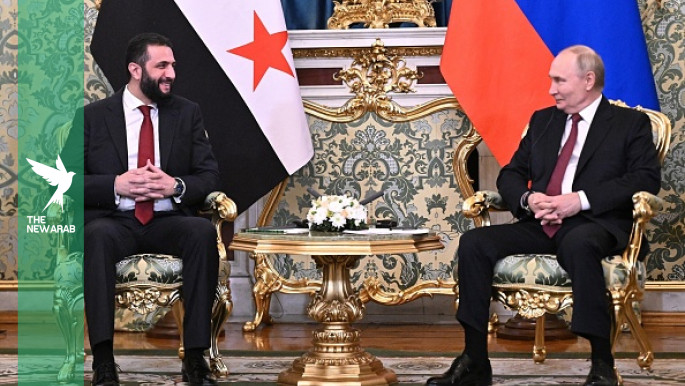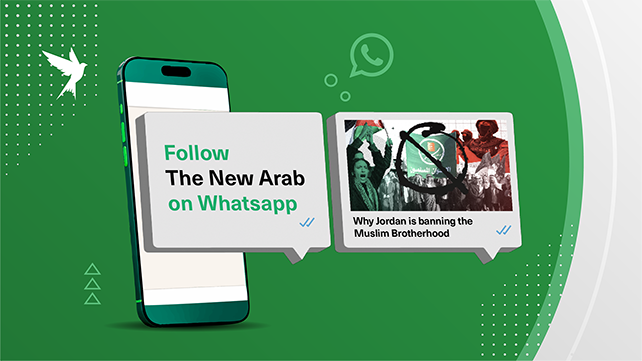Sharaa and Putin met for the first time since the fall of Russia’s close ally Bashar al-Assad [Getty]
Syrian President Ahmed al-Sharaa met Russian President Vladimir Putin in Moscow on Wednesday, marking his first official visit to Russia since taking office, and the first meeting between the two leaders since the fall of former dictator Bashar al-Assad.
The visit came despite the postponement of the Russian-Arab summit scheduled for the same day due to ongoing developments in Gaza ceasefire talks.
At the Kremlin, al-Sharaa said Syria was seeking to “reset its relations with Russia” and “redefine their nature so that Syria’s independence, sovereignty, and territorial integrity are preserved”.
He added that “bilateral relations and shared interests bind us with Russia, and we respect all previous agreements”, noting that much of Syria’s energy sector depends on Russian expertise.
Putin described Russian-Syrian ties as “relations of friendship” and said Moscow was ready to resume joint projects and restart the bilateral intergovernmental committee, which has been inactive since Assad’s December 2024 ouster.
“We maintain close relations with the Syrian people and seek to develop relations with Damascus,” Putin said. “Our ties with Syria span more than 80 years and have never been based on conditions or narrow interests, but on mutual benefit and the interests of the Syrian people.”
While officials framed the meeting as pragmatic, it triggered a wave of emotional reactions among Syrians online, many of whom still associate Russia with the destruction of their homeland.
“You really think he doesn’t think about all his comrades martyred by Russia? This is a masterclass in Realpolitik. Leading a nation requires stoicism,” a post on an X account called Syria Retold said.
“This is what a man must do to save his nation from peril. I do not envy President Ahmad al-Sharaa for the extremely difficult path he is navigating,” another X user added.
According to Syria’s state news agency SANA, al-Sharaa was accompanied by Foreign Minister Asaad al-Shaibani and Defence Minister Murhaf Abu Qasra.
Talks reportedly focused on the future of Russia’s military presence in Syria, including its bases in Hmeimim and Tartus, as well as cooperation in the energy sector and reconstruction.
The Kremlin confirmed that discussions covered “the fate of the Russian bases” and broader “regional and international developments of mutual concern”.
For many Syrians, seeing a new president welcomed in the Kremlin by the same government that backed Assad’s war effort was deeply painful.
“The Russian Federation is one of the world’s biggest terrorist organisations that cost the Syrian people the same amount of pain and suffering that the Assad regime did. This is an emotional day for a lot of Syrians, and I do understand everyone’s emotions from all aspects and sides,” Syrian activist Celine Kasem wrote on Facebook.
Kasem shared a photograph of a Russian leaflet dropped over Aleppo during the 2016 offensive, warning civilians of “annihilation”.
Russian media highlighted the pragmatic tone of the talks, noting that while Moscow seeks to retain its strategic foothold in the Middle East, Damascus wants assurances that Russia will neither rearm Assad loyalists nor interfere in Syria’s internal rebuilding process.
But for many Syrians, such diplomacy cannot be separated from moral memory.
“Russia ensured Assad’s regime survived all these years, crushing Syrians beneath it. It bombed schools, hospitals, and civilians across Syrian lands Politics may rise above morals and operate based on interests, but our human stance should be guided only by humanity, ethics, and noble values,” Syrian cinematographer and activist Abd Alhade Alani wrote, adding: “Russia is not a friend.”
Analysts see the visit as a sign of Moscow’s recognition of Syria’s new leadership and its intent to preserve influence through partnership rather than patronage.
Russian affairs expert Taha Abdul-Wahid told The New Arab’s Arabic edition that the meeting “reflects Russia’s official recognition of Syria’s new authorities and could pave the way for cooperation in fields that enhance Syria’s security and stability”.
He added that “for Russia, Syria remains an area of special interest due to its strategic location and long history of ties with Moscow”, while for Damascus, “relations with Russia will be crucial for balancing foreign policy and benefiting from Moscow’s position at the UN Security Council”.
Despite the warm tone, both sides appeared cautious. Russia has not agreed to extradite Assad or his former officials believed to be residing there, as requested by the Syrian government, nor to cancel Syria’s military debts.
Meanwhile, Damascus has opted to print its new currency in Germany and the UAE instead of Russia and has cancelled Moscow’s 49-year management contract for the port of Tartus, replacing it with an $800 million agreement with Dubai Ports World

